350 Search Results for aided language input
October 12, 2020
by Carole Zangari -
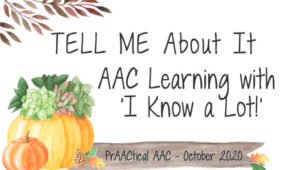
It’s time for another post with book-related ideas for supporting core vocabulary learning in preschool classrooms. Jeanna Antrim and Maggie Judson are back with another guest post in support of preschool teachers who are implementing the TELL ME program with their young students. Maggie and Jeanna are speech-language pathologists who work in the Assistive Technology Department for the Belleville Area Special Services Cooperative (BASSC) in southern Illinois. They are AT/AAC facilitators and provide evaluations, direct therapy, consultations, and trainings with school teams. ::::::::::::::::::::::::::::::::::::::::::::::::::::::::::::::::::::::::::::::::::::::::::::::::::: TELL ME About It: AAC Learning with ‘I Know a Lot!’ by Stephen Krensky TELL ME About The Book The second book in this new series is “I Know a Lot!”. If this is a new title for you, you will LOVE the adorable illustrations, simple text, repeated phrases, as well as the focus on adjectives! And remember last month how we talked about following the CAR (Comment... [Read More...]
September 14, 2020
by Carole Zangari -

Welcome to Year 2 of the TELL ME About It series, guest authored by Jeanna Antrim and Maggie Judson. For the past year, they’ve written monthly articles to discuss how they support preschool teachers who are implementing the TELL ME program with their young students. Maggie and Jeanna are speech-language pathologists who work in the Assistive Technology Department for the Belleville Area Special Services Cooperative (BASSC) in southern Illinois. They are AT/AAC facilitators and provide evaluations, direct therapy, consultations, and trainings with school teams. In Year 1 of this series, Jeanna and Maggie focused on the 11 books in the TELL ME program. In each of those posts, they shared a lesson plan, activity suggestions, video demonstrations, and much more. You can see their previous posts in the TELL ME About It series below. Max’s Breakfast If You’re Angry and You Know It The Lunch Box Surprise Come Out and Play, Little... [Read More...]
August 31, 2020
by Carole Zangari -
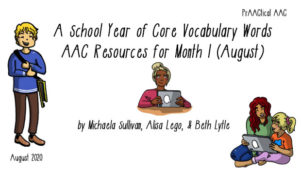
August may be on the way out but the words for this month are useful all throughout the year. The new Year of Core Words School Edition is in development and the plan is to get these monthly to you prior to the start of each month so that you can plan and prepare. Please bear with us for the first few posts as we get up to speed. Each of the monthly posts will highlight a selected set of words and a suggested order in which to teach them. You’ll also find resources, such as Activity Sheets for each word and data collection forms, and information on a key intervention strategy. The series authors, Michaela Sullivan, Beth Lytle, and Alisa Lego, created an introduction that you may want to review before digging into this month’s target words. You can see that here. Enjoy Month 1 of the School Year... [Read More...]
August 27, 2020
by Carole Zangari -
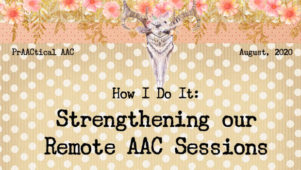
As online instruction and therapy continue to be an important service delivery option, practitioners are growing their skills and expanding their toolboxes. Today, we welcome back PrAACtical AAC contributor Sarah Gregory with more tips and suggestions for how to make these virtual sessions more engaging and productive. Sarah is an AAC SLP and AT Specialist in Ithaca NY where she supports students in public school settings. In this post, she shares tips, videos, and activity downloads for AAC telepractice. :::::::::::::::::::::::::::::::::::::::::::::::::::::::::::::::::::::::::::::::::::::::::::::::::::::::::::::::::::::::::::::::::::::::::::::: A new and uncertain school year has arrived and many of us will be continuing with some form of remote AAC support. In my last blog post (click here), I shared tips for getting started with AAC teletherapy and now we will look at structuring virtual sessions, creating and using digital materials, and providing Aided Language Input. And although I am sharing many digital activities and tricks, the most important... [Read More...]
August 13, 2020
by Carole Zangari -
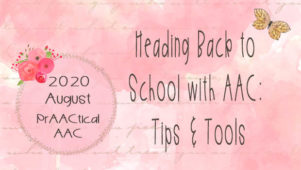
Here in the US, millions of teachers, therapists, families, and students are planning to return to school, whether virtually, in person, or with some combination of the two. No matter what the format for instruction, one of the most important things for students who use AAC is having their SLPs, teachers, and families on the same page. They each have a different but very intense relationship with the student’s AAC system. Today, we reprise a popular post with some prAACtical thoughts on getting everyone pointed in the same direction. 1. Develop a communication profile of the student: In the initial weeks, try to get a baseline of how the student is communicating at the start of the year. For beginning communicators, we track things like their communicative intents (WHY they are communicating), modalities (HOW they are communicating), and the frequency of their communication. We’ve written about one of our favorite... [Read More...]
July 20, 2020
by Carole Zangari -
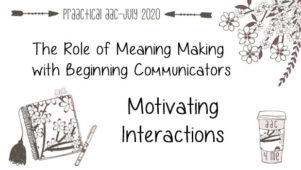
Finding ways to engage AAC learners is important to professionals across disciplines and service delivery settings. In today’s post, we feature guest author Kate McLaughlin, who is an SLP serving individuals with AAC needs in Connecticut. She shares a perspective on building engagement through the perspective of meaning making. ::::::::::::::::::::::::::::::::::::::::::::::::::::::::::::::::::: “Motivating” Emergent Communicators through Shared “Meaning-Making” & Communication Responsibility Are you a speech-language pathologist (SLP), teacher, or parent supporting an emergent AAC learner? Maybe you are just starting AAC with a learner who has a complex profile (for example, significant motor impairments, difficulties with motor planning, and/or sensory processing differences)? Maybe you have a learner who has learned to ask for some favorite things, but is not communicating beyond that? Do you struggle to “motivate” them? You’re not alone. I’ve met many kids who have been described as “not motivated to communicate.” I’ve also met many parents and professionals... [Read More...]
July 13, 2020
by Carole Zangari -
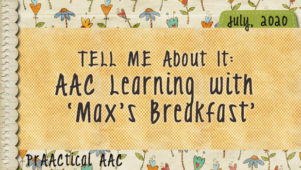
Welcome back to another installment of TELL ME About It, guest authored by Jeanna Antrim and Maggie Judson. Maggie and Jeanna are speech-language pathologists who work in the Assistive Technology Department for the Belleville Area Special Services Cooperative (BASSC) in southern Illinois. They are AT/AAC facilitators and provide evaluations, direct therapy, consultations, and trainings with school teams. In this series, they discuss how they support preschool teachers who are implementing the TELL ME program with their young students. Today, they walk us through the ways that they facilitate AAC use while focusing on the book ‘Max’s Breakfast’ Don’t miss their Lesson Plan, video demonstrations, and other resources at the end of the post. You can see their previous posts in the TELL ME About It series below. If You’re Angry and You Know It The Lunch Box Surprise Come Out and Play, Little Mouse No, David Go Away Big Green... [Read More...]
July 9, 2020
by Carole Zangari -
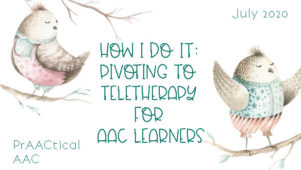
Over the past few months, I’ve been very impressed with the ways that educators and clinicians made a quick pivot from in-person teaching/therapy to providing support remotely. Some have taken what they’ve learned in this process and generously shared it with colleagues in their schools, clinics, and the broader AAC community. Today’s guest author, AAC SLP Sarah Gregory, is one such professional. Over the past few weeks, she’s not only served her own students but made the time to share what she has learned so that other professionals can benefit. In this post, Sarah discusses some of the YouTube videos that she created to help others become more comfortable with online therapy/teaching. ::::::::::::::::::::::::::::::::::::::::::::::::::::::::::::::::::::::::::::::::::::::::::::::::::::::::::::::::::::::::::::::::::::::: The end of the school year has given me time to reflect and organize some of the teletherapy tips, tricks and tools that I put into my YouTube videos this spring. I have really enjoyed giving and... [Read More...]
June 28, 2020
by Carole Zangari -
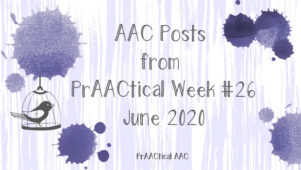
Happy Sunday, AAC friends. Here are some posts that may be of interest. Monday – Beyond AAC Modeling: 3 Things to Add to Your AAC Teaching Plan Tuesday – AAC Link Up Wednesday – Video of the Week: Pre-Symbolic Communicators, Core Vocabulary, & Aided Language Input Thursday – PrAACtically July – AAC Resources for A Year of Core Words: The Learn-at-Home Edition :::::::::::::::::::::::::::::::::::::::::::::::::::::::::::::::::::::::::::::::::::::::::::::::::::::::::::::: If you have the time, here are some past posts you may enjoy. AAC Skills Assessment for Direct Selectors Selecting AAC Apps & Devices: A Handful of Reasons Not to Skip the Trial Period Observational Assessment of Beginning Communicators Bilingual AAC Assessment Tips by Lindsay Oesch Say What?!? AAC Assessment for Children Who Speak with Dr. Jill Senner and Matthew Baud
June 25, 2020
by Carole Zangari -
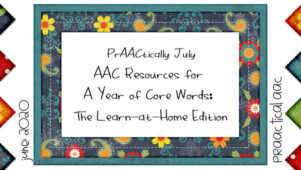
It’s almost July and that gives us an opportunity to turn our attention to an additional set of core vocabulary. Do you know anyone who has access to AAC tools but doesn’t yet use them throughout the day? Keiran has a new AAC app that is well-populated with core vocabulary. Gabbie has had an SGD for a while but doesn’t use it as frequently as her team had hoped. Hudson is transitioning from PECS to an AAC device with more robust language. While different in many ways, each of these learners has a common need: frequent opportunities to learn about and use core vocabulary. To accomplish this, their SLPs, teachers, and families select a dozen or so core words and pay special attention to those each month. That allows them to highlight this small group of words using focused language stimulation, aided language input, and specific activities designed to teach... [Read More...]









